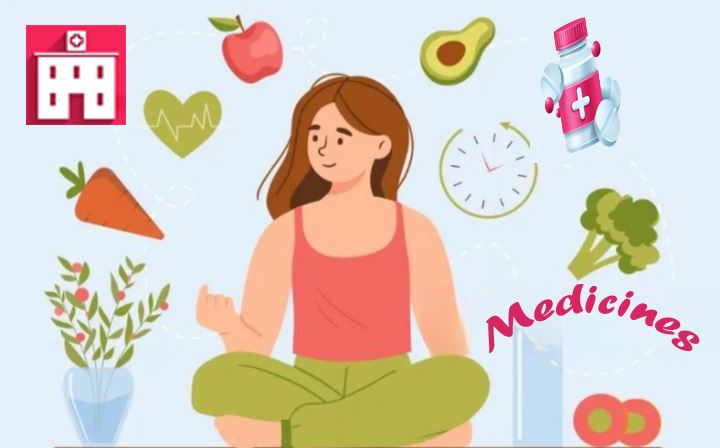Medication Insights: Balancing Health and Risks, Treatment
Since the first day, human beings have been striving to keep themselves healthy and prepared in the face of continuously changing seasons, conditions, and environments. This effort of humans has manifested in two forms: Firstly, in the diagnosis and treatment of various diseases, and Secondly, in the practice of health preservation principles. The connection of health preservation lies in maintaining a clean and stable environment around oneself and taking precautionary and preventive
measures. Precaution is always emphasized in treatment.
After the diagnosis of a disease, if proper treatment is administered correctly, along with various precautionary measures, controlling the disease becomes easier. On the contrary, the increasing trend of unnecessary use of medications leads to manifold issues, especially due to the numerous harmful effects of drugs, posing persistent risks to health. In light of these situations, it has been felt necessary to provide essential information to the public about the drugs used in various diseases. Awareness should be raised about the harmful effects of these drugs and precautions to be taken during their use. Additionally, information about the practices of multinational pharmaceutical companies should be disseminated so that medications are only discontinued after consulting a doctor and not prematurely, potentially weakening your financial position.
In the case of any illness, if medication is used perfectly, considering dietary precautions under the guidance of a doctor, controlling the disease becomes more manageable. The importance of natural treatment methods for controlling diseases is increasing day by day. Allah has endowed various fruits, vegetables, and grains with countless benefits. Regular consumption of honey, garlic, fresh greens, onions, olive oil, fenugreek, black pepper, psyllium husk, figs, and others can help prevent various diseases.
The purpose of food is certainly not to completely replace various types of medicines; each has its benefits. However, using these medicines under the guidance of a doctor, along with various dietary precautions and simple home remedies, makes it much easier to control diseasesduring their course.
The discovered medicines used for the treatment of various diseases in this century include allopathic drugs. Although these
medications quickly bring about health improvement, they may also leave certain effects that are unrelated to the actual disease treatment. These additional and unnecessary effects are termed side effects.
Generally, the harmful effects of drugs arise from their chemical impact. Most of these drugs cause common discomforts due to their effects. Sometimes, a harmful effect can reach a dangerous level, and if not treated in time, it can even lead to death.
It is also crucial to know that all the adverse effects of a drug do not manifest in every patient. Some patients experience one set of effects, while others may experience different ones. Some patients do not develop adverse effects at all. Various factors contribute to the manifestation of these effects, such as the patient’s gender, age, weight, diet, the quantity of the medication, and the nature of the disease. Sometimes, exceeding the prescribed dose of a drug can also lead to adverse effects. Similarly, neglecting the instructions regarding food and drink intake can also result in harmful effects.
Whenever you are using any medication alone or in conjunction with other medicines, be sure to consult the doctor regarding their possible adverse effects and precautions. Sometimes, merely changing the dosage or taking the medication with food can help avoid harmful effects. If this is not possible, the doctor can assist in eliminating or reducing these effects through alternative methods.
Navigating Health: Understanding Medications, Side Effects, and the Power of Preventive Practices
General safety measures include:
1- Always take medication according to the doctor’s advice and follow their instructions.
2- When taking medication, inquire with the doctor about its possible adverse effects to avoid unnecessary distress. Typically, details about such effects and other information are written on a piece of paper inside or on the packaging of the medication.
3- Remember, if you are pregnant, have high blood pressure, diabetes, or any other pre-existing condition, consult the doctor before taking any medication.
4- If you are allergic to any medication, be sure to inform the doctor.
5- If you start feeling unwell either during or immediately after taking medication, do not take it anymore and consult your
doctor.
6- Do not mix different medications. If you are using more than one medication, whether it’s aspirin or an antacid for acidity, be sure to inform your doctor. Avoid combining medications with alcohol.
7- Take the medication for the duration recommended by the doctor. Do not increase or decrease the dose during this period without consulting the doctor.



I really like reading through a post that can make men and women think. Also, thank you for allowing me to comment!
I’m often to blogging and i really appreciate your content. The article has actually peaks my interest. I’m going to bookmark your web site and maintain checking for brand spanking new information.
I do not even know how I ended up here but I thought this post was great I dont know who you are but definitely youre going to a famous blogger if you arent already Cheers